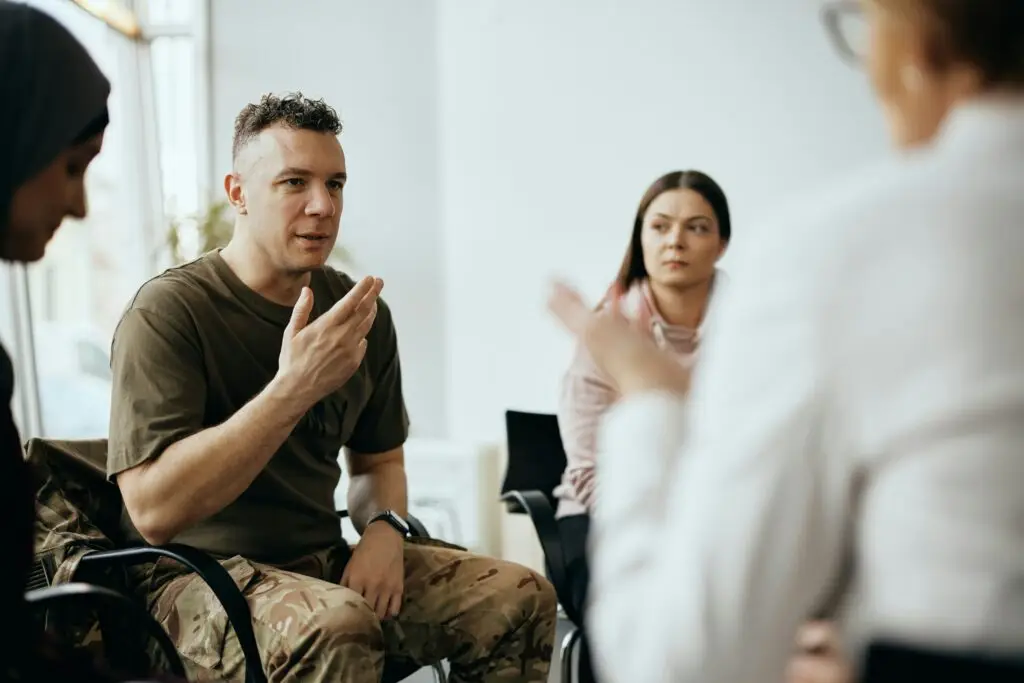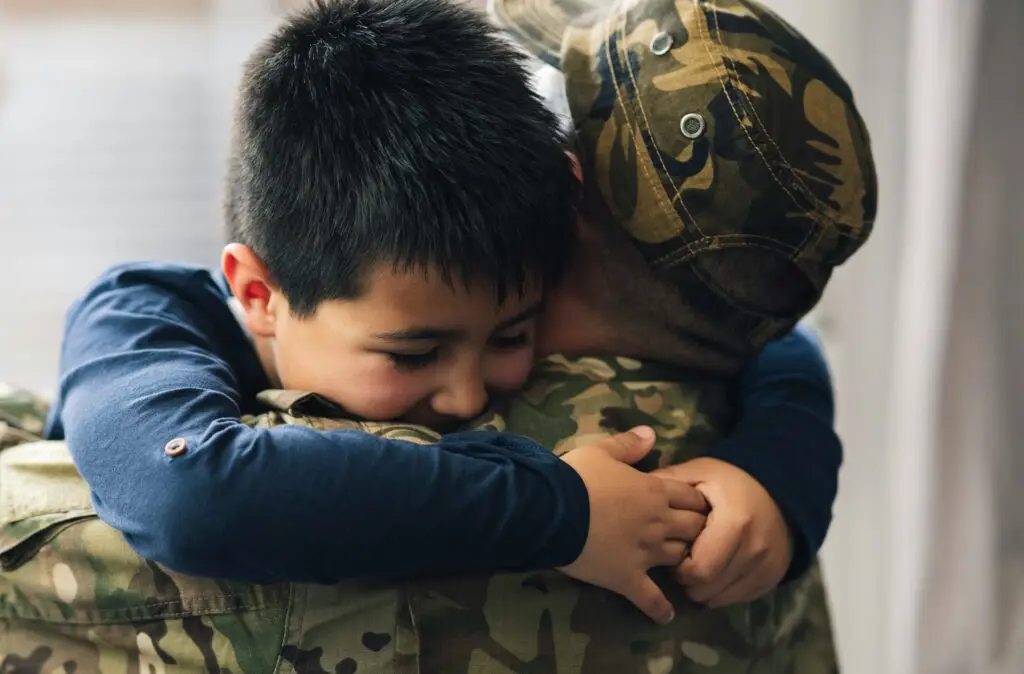Therapy for Military & Veterans
Your service and sacrifices deserve recognition, and your struggles deserve support.
Military life comes with unique challenges that most people don’t understand: constant moves, long separations, career disruptions, and the weight of always being “the strong one.”
Whether you’re active duty, a veteran, or a military spouse, there are many invisible burdens you carry.
We see you and are here to make sure you aren’t carrying those burdens alone.
Constantly explaining why military life is so demanding or why transitions feel so hard (even when they're supposed to be positive) is exhausting.
We get it.
Some of our therapists are military spouses themselves. We understand the challenges and unique aspects of military life, so you don’t have to spend energy explaining the culture or the constant uncertainty.
Right now, you may be experiencing:
- Isolation and loneliness from being far from family and starting over repeatedly
- Identity confusion about who you are beyond your military role or as a military spouse
- Anxiety about separations and missing important family milestones
- Communication challenges at home, despite being strong leaders professionally
- Career frustration from constant moves disrupting licenses, jobs, and professional growth
- Relationship strain from deployments, separations, and the stress of holding everything together
- Grief from transitions like leaving the military or moving away from a duty station you loved
The truth is: not all military trauma is combat-related.
Military spouses and families face their own traumas within this lifestyle: constant worry, relational trauma, and the weight of caring for everyone while the service member is away for long periods.
You have so much on your plate, and you deserve support, too.

Yes, you can thrive in this life.
We know military life will always have its challenges, but you can feel stronger and more connected through them.
Yes, you can thrive in this life.
We know military and veteran life will always have its challenges, but you can feel stronger and more connected through them.
Here's what becomes possible when you work with our military therapists:
- You process the unique stresses of military life without having to explain the culture
- You develop coping strategies for separations, moves, and uncertainty
- You reconnect with your partner and family after periods of distance or stress
- You rediscover your identity beyond your military roles and responsibilities
- You build resilience for handling whatever comes next in your military journey
- You find ways to create stability even when everything around you keeps changing
- You communicate more effectively with your loved ones about military stresses
We’re here to help you and your family not just survive military or veteran life, but truly thrive in it.
Whether you meet with us in person in New Bern or virtually from anywhere in North or South Carolina, we understand the demands of military schedules and can work around trainings and sudden changes.



We’re here to help you and your family not just survive military or veteran life, but truly thrive in it.
Whether you meet with us in person in New Bern or virtually from anywhere in North or South Carolina, we understand the demands of military schedules and can work around trainings and sudden changes.
You don't have to be strong all the time.
Service comes with sacrifices, and sometimes the impact lasts long after the uniform comes off or your partner retires.
Whether you’re active duty, transitioning out, a veteran, or a military spouse, you’ve given so much. You’ve been the one holding it together, adapting to constant change, and putting the mission or family first.
Whether you’re active duty, transitioning out, a veteran, or a military spouse, you’ve given so much. You’ve been the one holding it together, adapting to constant change, and putting the mission or family first.
But you don’t have to carry everything alone.
Therapy isn’t a sign of weakness. It’s a space to process the weight you carry and reconnect with who you are outside of your service.

Our Process
Getting started is simple.
STEP 1: Get Matched with a Therapist
Fill out our therapist matching form to tell us about your military experience. We’ll pair you with a specialist who understands military culture and fits your needs, preferences, and schedule.
STEP 2: Schedule a Free Consultation or Your First Appointment
Schedule a free 15-minute consultation with your therapist, or if you’re ready, go ahead and book your first full session. We understand military schedules can be unpredictable.
STEP 3: Begin Your Journey Towards Thriving, Not Just Surviving
Start working with your therapist to process your military experiences and develop tools to help you thrive in military life or your transition out of it.
Frequently Asked Questions
Why should I choose a therapist who understands military experiences?
When you work with a therapist who truly knows military life, you don’t have to spend energy explaining the culture, constant transitions, or the invisible weight you carry. We understand the demands of service, the impact on families, and the long-term effects of deployments and moves.
How can counseling help with deployment and family separation?
Military life often means long separations, sudden changes, and high levels of uncertainty. Therapy offers a space to process these challenges, learn practical ways to manage anxiety and stress, and strengthen your coping skills. It can also help you navigate the emotional distance that builds up and support reconnection.
What are the benefits of therapy for military spouses?
Frequent moves can disrupt your career, friendships, and sense of stability. Therapy can help you process feelings of frustration, loss of identity, or loneliness that often come with these changes. It’s a space to explore who you are beyond the roles you take on and find new ways to build community.
Can a therapist really understand my military trauma?
Yes. Our team includes providers who are military spouses or have worked extensively with active duty service members and veterans. We understand that trauma looks different for everyone—from combat experiences to the quiet grief of leaving the service. We’re here to help you process these stories at your own pace.
Is counseling only for crisis situations?
You don’t have to wait for things to fall apart to start therapy. Many military families find counseling helpful for managing daily stress, improving communication, and keeping relationships strong during demanding times. Therapy can be a proactive way to maintain mental health.
Do you accept TRICARE?
Yes, we are Tricare Certified Non-Network Providers. This means we’re approved to offer care to Tricare members, and you can use your Tricare benefits with us depending on your specific plan and eligibility.
It’s important to understand how your Tricare plan works:
- Tricare Prime is like an HMO. You’ll have a primary care manager and will need a referral to see us.
- Tricare Select works more like a PPO. You can see Tricare-authorized providers (like us) without a referral, giving you more flexibility, and your co-insurance follows your plans allowances. You do not need a referral to see us.
- Tricare for Retirees includes Prime and Select options, similar to active duty family plans, but with different enrollment fees and cost shares depending on your retirement status and eligibility.
- Point of Service (POS) option within Prime allows you to see Certified Non-Network providers (like us) without a referral, but at higher costs, which count toward your deductible. The deductible is $300 and once that is met, Tricare covers 50% of the appointment, leaving you responsible for the remaining 50%.
- If you have Tricare Prime and do not obtain a referral and wish to see one of our providers, you would be using the POS Option.
Navigating Tricare can feel overwhelming, and we’re here to help clarify what’s covered and what to expect. You can also confirm details directly with Tricare at 1-800-444-5445.
Ready to get support that understands your service?
Military and veteran therapy is available virtually across North Carolina & South Carolina, with in-person appointments in New Bern, NC.
Get in Touch!
Not sure where to start? Have a quick question about therapy, insurance, or which provider might be the right fit?
We’d love to hear from you. Send us a message and we’ll get back to you soon.
